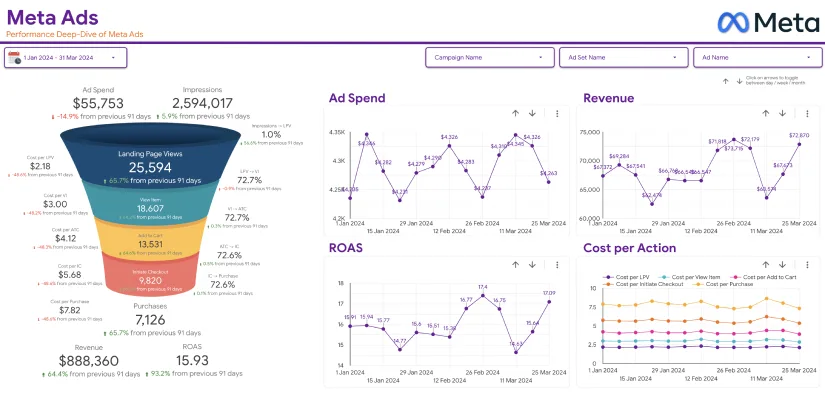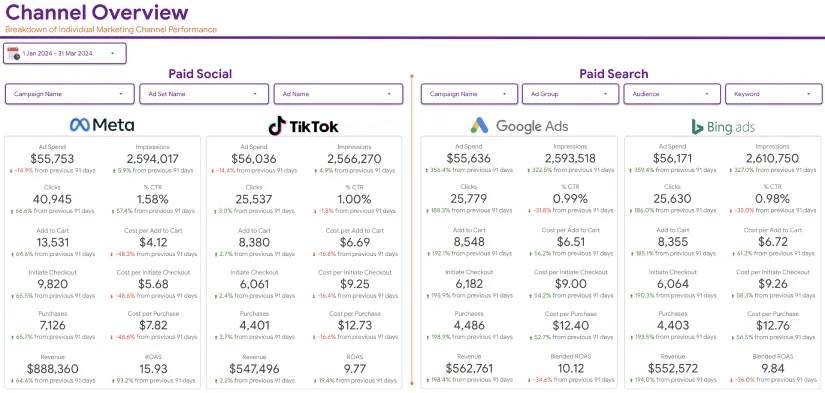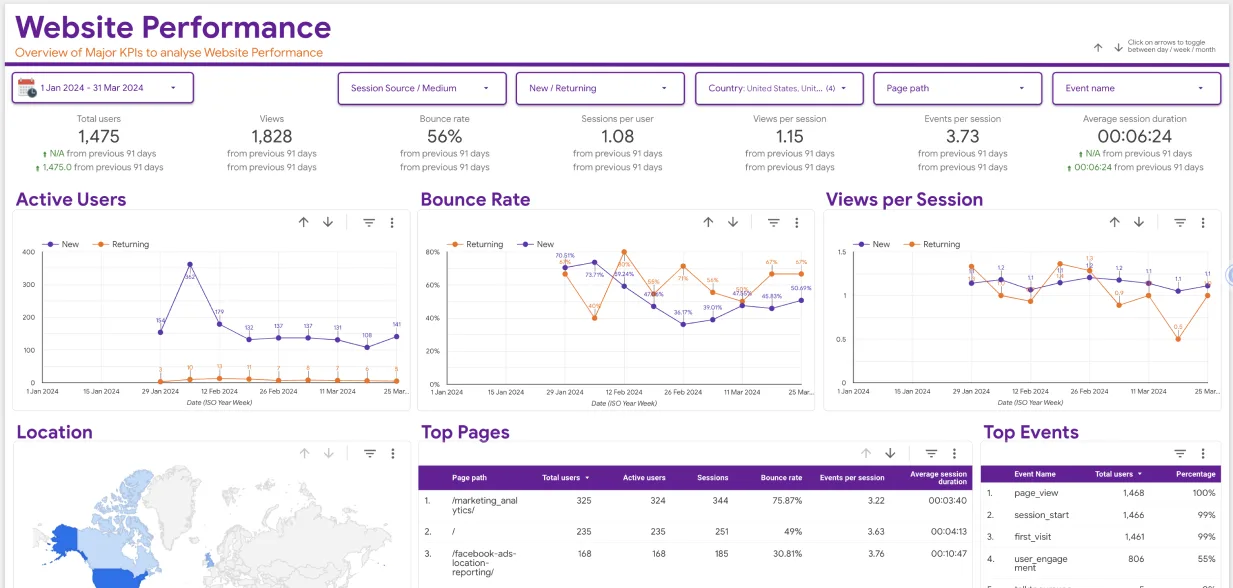What types of marketing reports do you implement in your strategy? Marketing reports play a critical role in your business. Marketing reporting gives companies useful information on marketing campaigns, channels, and projects. This information helps companies monitor progress, spot possibilities, and effectively address problems.
Businesses can use marketing reporting as a compass to assist them make smart, well-informed decisions. It is an effective tool for companies looking to expand, spur innovation, and find long-term success. Everything can be monitored and evaluated to gauge effectiveness. What differentiates you from the competition is what you do with the data. The most successful marketers utilize marketing reporting to transform data into useful insights that inform strategy and expand brands.
In this article, you will learn about the diverse types of marketing reports and their importance in creating a marketing report. Furthermore, the post will explore tips for creating a good marketing report.
What is a marketing report?
Marketing reports collect and evaluate marketing metrics to inform future marketing decisions, tactics, and performance. They provide insightful, useful information that enables you to reach company objectives and make critical decisions.
The aim of each report and the information you are reading determine which reports are different. They can ascertain the source of your traffic and leads, the material they interacted with before conversion, and the time it took to become users.
Well-written marketing reports provide all the information required to decide and act. You need less data to judge than you have. An effective marketing report can support the justification of marketing expenditures by demonstrating the extent to which marketing initiatives can target prospective consumers, build brand awareness, and increase revenue-generating sales leads.
Importance of Marketing Report
A marketing report can be quite helpful in helping you decide. Seventy percent of teams use market reports for their initiatives. How you use the data to make decisions or draw conclusions matters most in a marketing report.

Marketing reports are crucial because they can influence decisions made by different individuals inside the firm. Your marketing report should be customized for the person reading and using it, whether the CEO, department manager, or team leader.
Using marketing reports may save you a ton of time. Here are a few arguments in favor of their importance. Plan and automatically plan your marketing reports, whether you do it by setting up a regular reminder on your calendar or by scheduling the reports to run. Thanks to marketing reports, your reports will be distributed to the appropriate audiences with the guesswork removed.
Types of Marketing Reports You Need to Know
You can run reports to examine your marketing efforts more detail and efficiently track digital marketing activity. To help you get started, we’ve compiled the types of marketing reports you should know. Numerous marketing reports exist, each serving a distinct function. Segmenting the marketing activity into reports simplifies examining each approach in detail.
PPC Marketing Report
Indeed, an SEO marketing report and a PPC marketing report have comparable objectives. All that’s changed is that the metrics appear slightly different in a PPC report as you show that your efforts are generating more leads and visitors. Figures on click-through rates, expenses, sales, and ad success are all included in a quality PPC marketing report. If you continuously monitor your PPC analytics, they can significantly increase sales and conversions.
Because of the nature of PPC advertising, you must monitor your spending and return on investment to ensure that you are focusing on the right keywords and achieving the desired outcomes from your ad campaigns.
Your PPC report should assist you in tracking individual ad response rates and the campaign’s overall performance. This implies that you might enhance your ad copy to grab your audience’s interest and raise your click-through rate.

Of course, clicking on your advertisement is just the first step. For this reason, we advise adding certain website analytics to your PPC reports. This allows you to observe how prospective clients behave on your website. It also aids in evaluating the success of your landing pages and tests the degree to which your website’s content corresponds with search intent.
Social Media Report
Social media is an important way for the brand to engage its audience and draw in new customers. Assessing metrics such as follower growth, reach, and engagement—likes, comments, and shares on posts—is essential when using social media platforms like Instagram, TikTok, or Twitter.
In addition, since the most engaging posts will direct future content planning, a social media report should consider the specific performance of those pieces.
SEO Report
SEO reports are among the types of marketing reports that marketers utilize. The SEO report is a crucial model for anyone dealing with organic traffic and trying to rank higher on Google.
The model needs to use data from Search Console and Analytics to provide impressions, clicks, average positioning, and CTR in addition to impressions and clicks. By assessing the organic traffic generated by individual pages and the primary keywords leading to the website, this information can help make optimizations and content creation more purposeful.
Email Marketing Reports
Email marketing reports help you track whether campaigns are reaching your audience and achieving their engagement objectives. When reviewing email data, marketers also utilize solutions such as Mailchimp to automatically track campaigns. The statistics also show the open and reply to rates, as well as the number of emails that arrive in the recipient’s mailbox.
Inbound Marketing Report
This kind of marketing report considers every outcome that affects your plan and creates chances for the organization to grow. As a result, it will display bottom-of-funnel results from the CRM or marketing automation platform utilized first. Concentrating on sales and opportunity creation makes it easier to comprehend which channels are most pertinent to the project, what kinds of activities result in higher lead conversion rates, and how these facts might support future success.

Content Marketing Reports
Lastly, regarding our types of marketing reports is the content marketing report. These assessments evaluate the engagement and brand awareness of your digital content and often cover a variety of channels, including blog, podcast, and video performance. The number of visitors to your page, their average time on the page, and the number of likes, shares, and comments each article receives are some crucial metrics to monitor. Marketing teams may use this information to better understand their audience’s preferences and produce future content that follows suit, which makes it useful.
Tips on Creating a Good Marketing Report
Although full of facts, a marketing report doesn’t have to be dull. These are several guidelines for writing diverse types of marketing reports. This section will explore some tips for creating a good marketing report for your business or company.
Recognize your audience
Reports on marketing must take audience demands into account. Consider why you are producing the report before you start collecting data. It would help if you asked yourself the following questions:
- Who is making use of the report?
- What should they see or understand?
- Why is the information important to them (what are they attempting to accomplish or fix)?
If you’re not sure what your audience requires, inquire about the decisions they need to make. If the final aim is made clear, they can more easily run the statistics that are important to them.
Use language your audience understands
Keep your marketing reports free of cryptic or pretentious wording. Jargon can be confusing to your audience and hinder a lot of things. Unless you are certain that the audience is familiar with the terminology, there is no exception.
Words like “backlinks,” or “click-through rate” are familiar to your marketing staff from internal reports. However, a CEO might not understand these concepts. If you’re writing a marketing report for a diverse audience, make two reports with pertinent information and wording for each group.
Limit your ideas to one per page
To reduce distractions and increase conversions, web designers frequently employ the one concept (or one object) per page principle. Data processing is improved when marketing reports are treated with the same care. Leverage this concept in your marketing reporting.
Select KPIs that align with the objective
Effective marketing reports concentrate on the information required to make decisions and act. You don’t have to mention everything. Don’t use metrics that don’t clearly align with your audience’s objectives. Otherwise, you risk overstimulating or distracting them with unimportant details.
For instance, it is unlikely that Facebook likes data will assist you in taking appropriate action if a social media campaign aims to generate demand. Click-through rate and conversion rate are more useful KPIs to concentrate on. Both demonstrate how content matters.
Conclusion
If you work in marketing, it’s clear that you didn’t enter the industry to spend all your time writing reports. You are aware that marketing is all about statistics. To demonstrate that your efforts are having an impact and to assess the performance of your advertising activities quickly, you must prepare a strong report and understand all the types of marketing reports.






